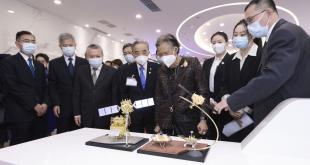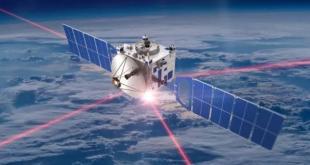by Dr. Fabio Tronchetti

What is China’s position on space resource activities? The following is a commentary on the Chinese approach following its submission to the Working Group on Legal Aspects of Space Resource Activities of the Legal Subcommittee of the Committee on the Peaceful Uses of Outer Space (COPUOS).
On March 6th, 2024, China submitted to the Working Group on Legal Aspects of Space Resource Activities of the Legal Subcommittee of the Committee on the Peaceful Uses of Outer Space (COPUOS) a document highlighting the country’s position towards the utilization of space resources and indicated selected issues that should be addressed as a matter of priory importance. The submission represents the first official initiative taken by China to delineate its approach on the regulation of space resources activities; unsurprisingly, this document has received significant attention in the press and among scholars. It seems, therefore, important to undertake an analysis of its content, indicating how the Chinese position differs from that expressed by other countries and assess its implications moving forward.
Recent developments in space resources activities
In the past decade, the Moon has returned to the centre of States’ space agenda. The United States and China are leading coalitions of States, respectively under the framework of the Artemis Program and the International Lunar Research Station (ILRS), with the aim of returning humans to the Moon, building facilities on its surface, and possibly using lunar resources to sustain their missions.
These plans have spurred numerous initiatives intended to fill the gaps left open by the space treaties about activities undertaken on celestial bodies. The 1967 Outer Space Treaty (OST) only declared celestial bodies non-appropriable (Art. II, OST) and recognized the right of States to explore and use outer space, provided that such exploration and use are carried out for the benefit and in the interest of all countries (Art. I, OST). However, the OST does not specify how these principles apply to activities carried out on a celestial body, leaving, thus, key questions open to diverging interpretations (i.e. are resources appropriable? Is their use, particularly for profit, consistent with the OST?)
The Moon occupies a place of special importance in the Chinese space program.
In the last decade, four States- the United States, Luxembourg, the UAE and Japan- have enacted national space resources utilization laws; these laws not only affirm the legality of the use of resources for profit but also lay down the regulatory foundation to authorize private space resources activities.
In 2020 the United States went one step further by delineating in a document called the Artemis Accords, a series of principles intended to guide the activities of the States participating in the Artemis Program. The Accords contain several provisions that, while intended to give shape to the principles of the OST in the context of lunar activities, raise questions associated with their consistency with the Treaty itself. The possibility of establishing ‘safety zones’ on the Moon’s surface to prevent harmful interference with one’s mission represents a perfect example of this controversial approach (are ‘safety zones’ consistent with the non-appropriative nature of the Moon?).
Importantly, the developments described above occurred outside of the traditional international law-making framework for space activities that has in COPUOS, and specifically its Legal Subcommittee, its centrepiece. This has raised concerns relating to the fragmentation of international space law and the de-legitimation of the law-making role of COPUOS.
To reconcile different positions and ideally develop a common understanding of the rules governing space resources utilization activities, States agreed to discuss the matter in the COPUOS’ Legal Subcommittee. In 2022 a Working Group on Legal Aspects of Space Resource Activities was set up with the goal, inter alia, to develop a set of initial recommended principles for such activities by 2027.
China and the Moon
The Moon occupies a place of special importance in the Chinese space program. Between 2007 and 2020, China undertook the first phase of its lunar exploration program, which included orbiting the Moon with a probe, landing a rover on the Moon’s surface and its far-side, and automated collection of lunar samples. China is now entering the second phase of its lunar exploration program, consisting, first, of a series of missions to study water deposits and other physical resources at the South Pole of the Moon and then, the construction of a lunar research station. To achieve this goal, China has launched the International Lunar Research Station (ILRS) initiative, which has been joined so far by 8 countries with 10 other States currently negotiating their participation.
Unlike the Artemis Program, the ILRS does not have a regulatory instrument to guide the activities of its participants; up to this moment, China has only concluded cooperation agreements with the participating States, even though it has made clear its intention to develop more detailed arrangements on a bilateral basis. China describes the ILRS as a scientific research facility open to all interested countries and envisions the use of lunar resources for scientific research and support of its mission.
Notably, China has not enacted a national space resources utilization law nor has launched any initiative outside of COPUOS to promote its interpretation of the space treaties about space resources activities.
The Chinese submission to the Working Group
China submitted to the Working Group on Legal Aspects of Space Resource Activities of the Legal Subcommittee of COPUOS to respond to the Chair’s invitation to provide information on the mandate and purpose of the Working Group. The submission will be instrumental in directing Chinese actions in two highly important upcoming events organized by the Working Group, respectively the Expert meeting (March 2024) and the International Conference on Space Resources (June 2024).
Unlike the Artemis Program, the ILRS does not have a regulatory instrument to guide the activities of its participants
China’s submission addresses three main areas: 1) The mandate of the Working Group; 2) The existing legal framework for space resources activities; and 3) Elements for the Development of Initial Recommended Principles.
– Mandate. China proposes a rather practical approach to the mandate of the Working Group; it recommends linking discussions to the major space exploration projects of state members. In suggesting so, China seems to advise the Working Group to refrain from theoretical debates on space resources activities and to instead focus its attention on the concrete problems that States are envisioning to encounter. Such a recommendation also serves as a warning to the Working Group to keep an eye on potential dilatory practices that delegations may put in place to prevent any meaningful progress in COPUOS. China’s pragmatic approach also emerges in relation to the suggestion to focus discussions on physical resources, such as water-ice in lunar regolith and rocks, rather than on resources that are not physical in nature (solar energy).
– Existing legal framework for space resources activities. The Outer Space Treaty is described as the cornerstone of the existing legal framework for space resources activities; considering its importance, China emphasizes the need for the Treaty to be at the core of any attempt to regulate these activities within the Working Group.
China also recommends the Working Group seek a uniform interpretation and application of the principles of the OST and, thus, refrain from embracing views that favour single nations. Through this recommendation, China is urging the Working Group to maintain a neutral approach during discussions and to avoid giving up to the political pressure of certain delegations. China’s words, thus, sound like a warning to the Working Group about the risk that certain States might use its discussions as an opportunity to gather support towards their interpretation of the space treaties rather than seeking a uniform understanding of their provisions; the same delegations might even go one step further and hamper any attempt to agree on an interpretation/approach that would not reflect their own.
One should always keep in mind that, unlike other countries, China has not promoted a somewhat controversial interpretation of the OST provisions outside of the COPUOS framework; instead, at least on paper, China appears to be willing to cooperate with other States to develop a uniform interpretation of the space treaties and to create the foundations for a cohesive and peaceful growth space resources activities. The present submission is the first evident manifestation of China’s willingness to engage in multilateral negotiations on this subject.
– Elements for the Development of Initial Recommended Principles. China argues that, due to the novelty of space resource activities, recommended principles should be structured in a practical and measured way. Accordingly, China gives input on five issues that it deems to have priory importance, respectively:
a) Reaffirming and Operationalizing the Principle of Non-appropriation
China believes that any form of exploration, exploitation and utilization of space resources shall be consistent with the non-appropriation principle outlined in Art. II, OST, and that the Working Group shall make efforts to operationalize its meaning in the context of space resources activities.
China has not enacted a national space resources utilization law nor has launched any initiative outside of COPUOS
In fairness, there does not seem to be anything remarkably innovative in such a statement and, in any case, no meaning beyond what was intended by China should be given to it. First, China recognizes the centrality of the non-appropriation principle in the space law system, a centrality that should be maintained in the realization of space resource activities. Secondly, China is not suddenly recognizing the legality of the commercial utilization of space resources; over the years, directly and indirectly, China has conceivably deemed the use of space resources, including for purposes other than scientific. What China has opposed in the past has been the method used by certain countries, particularly the United States, to affirm the legality of the use of space resources for profit (and the possibility of licensing private companies to do so) through national and quasi-multilateral initiatives rather than seeking recognition and acceptance of such interpretation within COPUOS first. This is why China is calling upon the Working Group to make efforts to reach a uniform understanding of the meaning and application of the non-appropriation principle to space resources activities, as only such a common approach would be conducive to their orderly growth.
b) Encouraging Space Resource Activities for Scientific Investigation
Space resources might be used for two purposes, scientific and commercial (for profit). China argues that the legality of the form under the Outer Space Treaty is unquestionable because it falls within the scope of the freedom of scientific investigation of outer space provided by Art. I(3) OST; additionally, State practice has confirmed the right of States to collect lunar samples for study; indeed, both the United States and China have collected samples of lunar rocks in the course of their scientific investigation of the Moon and shared some of these samples with international partners. On the contrary, the legality of the use of resources for profit under the OST remains a matter of debate; as described, in principle China does not oppose such a form of use but it requires its legality to be formally recognized by the international community in COPUOS rather than declared by individual countries outside of the UN framework. At this moment, what is important for China is to recommend the Working Group develop principles to mitigate the potential negative impact that commercial space resources activities might have on activities undertaken for scientific investigation. It is evident from this that China is encouraging the Working Group to take steps to promote space resources activities for scientific purposes and to ensure coordination among the different lunar plans proposed by States.
c) Enhancing the Coordination of Space Resource Activities
China recognizes the existence of parallel lunar projects and the possibility that these projects might be undertaken simultaneously in certain specific areas of the Moon. Mindful of this scenario, China invites the Working Group to formulate initial recommended principles to give effects to the terms of Article IX, OST, which provides that space activities shall be guided by the principle of cooperation and mutual assistance and be conducted with due regard to the interests of other States. The reference that China makes to Art. IX, OST, is particularly relevant because it indicates China’s belief that the two major existing lunar projects, namely, the Artemis Program and the ILRS, might peacefully co-exist and non-necessarily be the cause of tensions between the United States and China. For these two projects to co-exist, however, the Working Group must prepare principles favouring cooperation between the two sides, for example in the areas of technical assistance, rescuing of astronauts and sharing of scientific data. Significantly, in its submission China does not comment on the permissibility of ‘safety’/non-access zones around lunar facilities; therefore, it remains to be seen how China will approach the question of the prevention of harmful interference in the upcoming Working Group’s sessions.
d) Sufficient Supervision of Space Resource Activities of Non-governmental Entities
China’s submission emphasizes repeatedly the need for space resources activities to be consistent with the OST. This is true not only about their compliance with Art. II of the Treaty but also with the requirements outlined in Article VI, a key provision of the Treaty that establishes the principle of the State’s international responsibility for national activities in outer space, including those undertaken by non-governmental entities, and the duty of States to continuously supervise the private space activities that they have authorized. In China’s view, the means to implement Article VI’s requirements for space resources activities remain questionable; indeed, because these activities will occur on a celestial body, it is uncertain how States could effectively and continuously supervise them to ensure that they do not interfere with the operations of other players. For this reason, China recommends the Working Group to investigate methods to implement Art. VI to space resources projects, for example through the formulation of standards and procedures for authorization and supervision. It remains to be seen how China will detail this recommendation during future Working Group discussions, for example, what kind of standards it will propose; it is, however, evident that China wants to avoid situations in which, due to political pressure, international competition, or simply because a company has become ‘too important to be regulated” a State might authorize a company to carry out space resources activities without performing reasonable safety checks or having procedures to adequately control the licensed activities.
e) Protecting Sustainability of Space Resource Activities
Finally, China recommends the Working Group formulate principles to render space resource activities sustainable and accessible to future generations. While China does not elaborate upon the meaning of the concept of sustainability, it indicates that the principles should aim at preventing the disruption of lunar resources (and, indirectly, of the environment that contains them). Arguably, the implementation of this idea would require effective means to control space resource activities, a point that links this recommendation to what China had already expressed in connection to the supervision of private activities (see supra IV.d).
Conclusion
China’s submission marks an important step forward in the ongoing international efforts to regulate space resource activities. Even though the submission is broadly worded and does not specify how China intends to elaborate upon the ideas that it proposes, it is a sign that the country takes the Working Group seriously and views COPUOS as the main law-making forum for space activities. Ultimately, the submission shows that China, at least on paper, is willing to engage in meaningful discussions with other States, including its direct competitors, to achieve a mutual understanding of the space treaties that are needed to enable space resource activities to grow peacefully and sustainably.

Dr. Fabio Tronchetti works as an Associate Professor at the School of Law of Northumbria University (United Kingdom). Previously, he was Co-Director of the Institute of Space Law and Strategy and Associate Professor at Beihang University, Beijing (China), Adjunct Professor of Comparative National Space Law at the School of Law of the University of Mississippi (United States), Lecturer at the International Institute of Air and Space Law, Leiden University (the Netherlands). Dr. Tronchetti is the recipient of the 2019 International Institute of Space Law (IISL) Young Achiever Award and is a Director of the International Institute of Space Law (IISL).
 SpaceWatch.Global An independent perspective on space
SpaceWatch.Global An independent perspective on space




